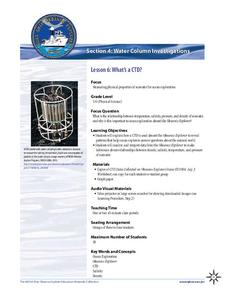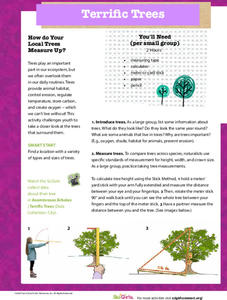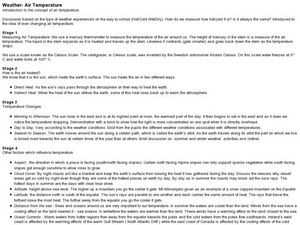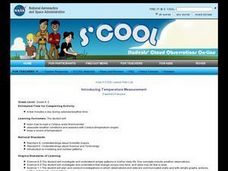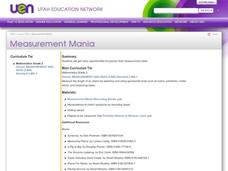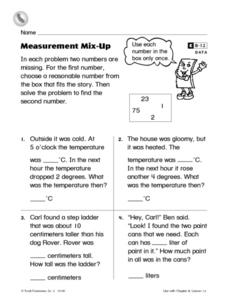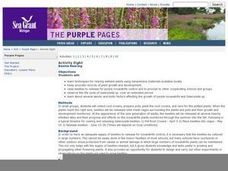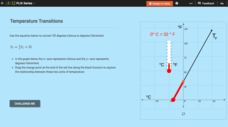NOAA
What's a CTD?
Why are the properties of the water important when exploring the ocean? Young scientists discover the tools and technology used in deep sea exploration in the fourth installment in a five-part series. Groups work together to examine...
Chicago Botanic Garden
Historical Climate Cycles
Scientists use ice core samples to obtain temperatures of the earth from 400,000 years ago! The third of five lessons instructs pupils to interpret historical climate data to see changes over time. In part I, participants interpret...
Colorado State University
Why Does it Get Colder on a Clear Night than a Cloudy Night?
Clouds are nature's insulator! A lab investigation asks learners to use an infrared thermometer to measure differences in infrared temperatures. They find that pointing the thermometer at a cloud has a much different result than pointing...
Kenan Fellows
What Is Heat?
If objects have no heat, how do they can gain and lose it? Scholars experiment with heat, temperature, and specific heat of various substances. They create definitions for these terms based on their own conclusions to complete the fourth...
PBS
Terrific Trees
Engage in a shady activity to practice measurement techniques. Classes venture outside to collect measurements of various trees, using different strategies to measure the height, trunk circumference, width, and crown size. Then they...
NASA
Using Models in Climate Change Research
Explore models through the relevant lens of climate change! Investigators watch a video about using models and their application for evaluating temperature data and climate change. Scientists read an article on climate change and answer...
Curated OER
Introducing Temperature Measurement
Students read a thermometer, associate weather conditions and seasons with temperature changes and keep a record of daily temperature.
Curated OER
Weather-Air Temperature
Students complete activities to learn about changing air temperature. In this air temperature instructional activity, students study various ways to measure air temperature and learn factors that influence temperature. Students study the...
Curated OER
Introducing Temperature Measurement
Students explore temperature and use Celcius thermometers to measure and graph the temperature in the classroom daily. They estimate what they think the temperature might be and then find the actual temperature in the room.
Curated OER
Hurricane Strength: Spatial Association of Wind Speed and Water Temperature
In this hurricane worksheet, students read and analyze satellite images of hurricane Rita. They complete 4 short answer questions about it.
Curated OER
Measurement Mania
Second graders get many opportunities to practice their measurement skills.
Curated OER
Measurement Mix-Up
For this measurement worksheet, 2nd graders read 4 word problems and find the two numbers missing in each one. Students choose a reasonable number from the box that fits the story for the first number and then solve the problem to find...
Curated OER
temperature and the Scientific Method Lesson Plan
Sixth graders study heat, temperature, and heat transfer. Using probeware, the teacher demonstrates boiling points. Students participate in experiments and record the beginning and ending temperatures and mass of objects. After...
Curated OER
Weather Lesson 1
Students describe and compare the layers of the atmosphere. They explain how to measure the temperature of the atmosphere. They also explain what causes the atmosphere to heat up in some places more than in others.
Curated OER
Unit 1 Matter and Energy
Topping this worksheet is a comprehensive collection of notes about phase changes. The phase change graph is displayed, along with formulas for the gas laws, and information relating energy to change of phase. After reviewing these...
Curated OER
Village Research
Sixth graders research global warming. In this science lesson, 6th graders collect data in the Waterton Townsite, Apgar Village and St. Mary area. Students interpret the data and form a hypothesis about global warming.
Curated OER
Don't Slip!
Students measure, record, and graph the force of moving a block of wood along sand paper. In this friction lesson plan, students read a spring scale, collect data, construct a graph, and propose a model to explain how fiction works.
Curated OER
Beetle Rearing
Students investigate plants and the effects beetles have on the plants. In small groups, they collect plants and observe the beetles as they interact with the plants. They record the conditions including temperature, cloudiness, length...
Michigan State University
Gases Matter
Young scientists learn that seeing isn't necessarily believing when it comes to the states of matter. After performing a fun class demonstration that models the difference between solids, liquids, and gases, children complete a series of...
Bonneville
Passive Solar Water Heating
Put empty milk jugs to good use. Scholars consider the characteristics they might change about a milk jug to improve light absorption. They design a passive solar water heater using the milk jug and then measure the temperature change in...
Chicago Botanic Garden
What Can Tree Rings Tell Us About Climate?
Tree rings are slightly thicker on the south side of the tree because it receives more sunlight. Part two in a series of five lessons helps learners analyze tree rings to determine the environmental conditions that caused size...
CK-12 Foundation
Linear Equations: Temperature Transitions
Explore linear conversions using an engaging interactive lesson. Learners drag a point on a graph to discover the equivalent degrees in Fahrenheit and Celsius. Embedded questions highlight key features such as slope and the y-intercept.
Core Knowledge Foundation
Weather or Not, Seasons Change
Embark on a year long investigation of the seasons with this 10-lesson earth science unit. After being introduced to different types of weather and the tools used to measure it, young scientists perform fun hands-on activities that teach...
Curated OER
Temperature Change and the States of Matter
Tenth graders observe the processes of evaporation, condensation, melting, freezing, boiling, and sublimation. They do a quantitative investigation of the freezing of water, to explore explanations that involve particles.


